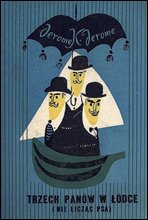
보트 위의 세 남자 (Three Men in a Boat) 영어로 읽는 명작 시리즈 335
- 저자<제롬 K. 제롬 (Jerome Klapka Jerome)> 저
- 출판사논객넷 출판사
- 출판일2017-04-20
- 등록일2018-12-11
- SNS공유


- 파일포맷EPUB
- 파일크기1MB
- 공급사YES24
-
지원기기
PC
PHONE
TABLET
프로그램 수동설치
전자책 프로그램 수동설치 안내
아이폰, 아이패드, 안드로이드폰, 태블릿,
보유 1, 대출 0,
예약 0, 누적대출 1, 누적예약 0
책소개
1889년 영국에서 출간된 코믹소설로, 킹스턴에서 옥스퍼드까지 보트를 타고 여행하는 세 남자에 관한 이야기.백과사전에 나오는 모든 병명을 가진 주인공이 재충전을 위해 두 친구와 개 한 마리와 함께 보트를 타고 여행하기로 하면서 소설은 시작된다. 그러나 낭만적인 여행과 휴식을 기대했던 남자를 기다리는 것은 끝을 모르고 이어지는 불행한 사건들뿐이다. 야영을 할라치면 비가 추적추적 끊임없이 내리고, 혼자 멋있게 아침 수영을 즐기자니 차갑다. 비슷한 생각으로 보트를 끌고 나온 많기도 강 위에서 교통체증을 겪고, 벌어지는 가운데 생명의 겪기까지 한다. 나온지 100년도 더 지났지만 그 유머와 위트는 현재에도 동일하게 느껴질 정도로 명작이다.
(en.wikipedia.org 를 참조하였습니다. ) 출처 : http://englishbookfree.tistory.com/18
____________________
Three Men in a Boat (To Say Nothing of the Dog),[Note 1] published in 1889, is a humorous account by English writer Jerome K. Jerome of a two-week boating holiday on the Thames from Kingston upon Thames to Oxford and back to Kingston. The book was initially intended to be a serious travel guide,[1] with accounts of local history along the route, but the humorous elements took over to the point where the serious and somewhat sentimental passages seem a distraction to the comic novel. One of the most praised things about Three Men in a Boat is how undated it appears to modern readers ? the jokes seem fresh and witty even today.[2]
The three men are based on Jerome himself (the narrator Jerome K. Jerome) and two real-life friends, George Wingrave (who would become a senior manager at Barclays Bank) and Carl Hentschel (the founder of a London printing business, called Harris in the book), with whom Jerome often took boating trips. The dog, Montmorency, is entirely fictional[1] but, "as Jerome admits, developed out of that area of inner consciousness which, in all Englishmen, contains an element of the dog."[2] The trip is a typical boating holiday of the time in a Thames camping skiff.[Note 2] This was just after commercial boat traffic on the Upper Thames had died out, replaced by the 1880s craze for boating as a leisure activity.[citation needed]
Following the overwhelming success of Three Men in a Boat, Jerome later published a sequel, about a cycling tour in Germany, titled
목차
■ 보트 위의 세 남자 (Three Men in a Boat)PREFACE.
● Three Men in a Boat
CHAPTER I.
CHAPTER II.
CHAPTER III.
CHAPTER IV.
CHAPTER V.
CHAPTER VI.
CHAPTER VII.
CHAPTER VIII.
CHAPTER IX.
CHAPTER X.
CHAPTER XI.
CHAPTER XII.
CHAPTER XIII.
CHAPTER XIV.
CHAPTER XV.
CHAPTER XVI.
CHAPTER XVII.
CHAPTER XVIII.
CHAPTER XIX.
Footnotes.
초판 Cover & story
저자 사진 및 프로필
원서로 읽는 세계 명작 시리즈
판권 페이지















